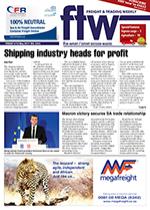The newly formed South
African Federation of Trade
Unions (Saftu) – led by
trade union heavyweight
Zwelenzima Vavi – has
joined the call to ban scrap
metal exports to ensure the
global competitiveness of
downstream steel producers –
and thus safeguard jobs.
According to Vavi, a ban
on exports from South Africa
would create a surplus of scrap
material locally which would
in turn lead to reduced prices
and thus create a competitive
advantage for the growth of
an industry that could easily
beneficiate this material
into secondary value-added
products,” he said.
Scaw Metals CEO, Markus
Hannemann, agreed noting
that there was enough scrap
steel available locally but
that exports of the product,
mostly to India and Pakistan,
had pushed up local prices
of scrap steel, thus affecting
the local manufacturing
competitiveness.
He pointed out that
government’s solution to
industry cries for a ban on
scrap metal exports had been
to introduce the preferential
pricing system (PPS) in 2013
in an attempt to limit the
export of both ferrous and
non-ferrous scrap.
The terms of the PPS
dictate that local buyers of
scrap metal, such as foundries,
mills, mini-mills and
secondary scrap processors,
are supposed to get the
product at a price below the
international spot price.
But, added Hanneman,
the PPS had so far proven
to be ineffective in limiting
the export of scrap material
because scrap exporters
found ways to circumvent the
regulations.
Virusha Subban, a partner
specialising in customs, excise
and international trade at law
firm Bowmans, explained
that such tactics included
inflating the preference price
by charging for delivery
over and above the quoted
price, demanding impossible
sale conditions, upfront
cash payment or reams of
documentation before selling
to local buyers.
“On the other hand, scrap
dealers complain of tonnes
of waste metals piling up in
their scrapyards due to the
time delays involved in first
offering local industry, then
applying for a permit and
waiting for it to be granted,”
she said. The scrap dealers
argue that although most
applications may be approved,
all delays in the movement
of the metal increase their
exposure to commodity
market risks and precipitate
cash-flow issues.
Trade union federation joins call for scrap metal export ban
12 May 2017 - by Adele Mackenzie
0 Comments
FTW - 5 & 12 May 2017

12 May 2017
12 May 2017
12 May 2017
12 May 2017
12 May 2017
12 May 2017
Border Beat
Poll
Featured Jobs
New
New
New
